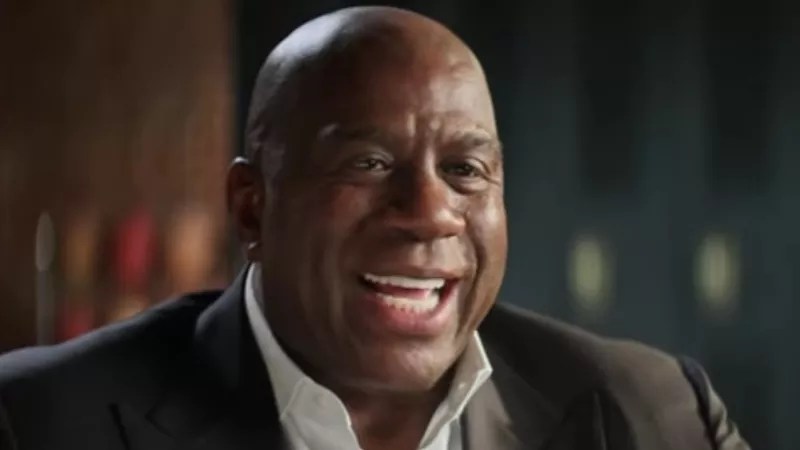
Apple TV+ via YouTube

Audio By Carbonatix
The latest twist in the bidding war for the Denver Broncos is the revelation that Earvin “Magic” Johnson has joined a group of candidates led by billionaire Josh Harris, co-owner of the Philadelphia 76ers and the New Jersey Devils.
Harris is no doubt hoping that the former Los Angeles Lakers superstar will boost his chances with the National Football League, which has repeatedly emphasized that diversity will be an important factor when determining who will win the franchise. But Johnson’s participation also lays bare the tokenism at the heart of this process – one also reflected in the way the NFL has handled (or, more appropriately, mishandled) the controversy over its dearth of Black head coaches.
Johnson is certainly having a pop-cultural moment right now. He’s among the main figures in HBO’s Winning Time: The Rise of the Lakers Dynasty, an entertaining yet controversial series from director Adam McKay, a Denver native. Both Jerry West and Kareem Abdul-Jabbar, who are portrayed in the offering that just ended its first season, have been critical of the series, but Johnson hasn’t kicked up much of a fuss, likely because he’s the focus of They Call Me Magic, an Apple TV+ docuseries that qualifies as an authorized, full-scale hagiography.
But although Johnson has certainly done very well for himself from a financial perspective, his net worth is estimated at $620 million – significantly less than the $5.2 billion he would have collected had he accepted a Nike stock endorsement deal he was offered at the dawn of his professional career, as hilariously dramatized in Winning Time. That’s small potatoes when it comes to the $5.7 billion bank account boasted by Harris and the $70 billion held by Walmart heir Rob Walton, the two clubhouse favorites in the Broncos sweepstakes. And it’s also less than the $4.5 billion in the coffers of Todd Boehly, the third publicly identified bidder, out of a reported five finalists.
It’s unclear whether Boehly is still in the game, since he and some wealthy partners just forked over an estimated $5.25 billion for Chelsea F.C., an iconic soccer squad. But the fact that Johnson has hooked up with Harris despite his previous association with Boehly, with whom he teamed to buy the Los Angeles Dodgers, quickly led to speculation that Boehly has moved on from the Broncos.
Still, the Dodgers deal offers a window into how much Johnson might bring to the table in a Broncos deal. Johnson’s share of that purchase was $50 million, which would constitute an extremely modest slice of the Broncos purchase price. His main value, then, would be as a symbol of Harris’s devotion to diversity, and not as a major backer.
Two of the five Broncos bidders still haven’t been publicly named, but Robert F. Smith, another Denver native who’s the richest Black man in America (his net worth is calculated at about $8.9 billion), doesn’t appear to be among them.
Smith, whose baggage includes recent issues with the IRS and concerns regarding his Flyfisher Group‘s actions in Five Points, was said to have been thinking about making a run for the Broncos in March. But last week, a Smith spokesperson told CNBC, “Robert’s priorities right now are on the fight for voting rights and economic justice rather than being a Black owner of a team. He continues to be most focused on how he can best help underserved communities gain access to capital, healthcare, education, and the ballot box. Pursuing ownership of the Broncos is not on his radar.”
Meanwhile, the NFL still faces a lawsuit from former Miami Dolphins head coach Brian Flores, whose complaint includes claims that Broncos executive John Elway conducted a sham interview with him in 2019 before giving Denver’s head-coaching gig to the very Caucasian Vic Fangio. Elway denies the assertion, but there’s no refuting NFL head-coaching math: Last year, five people of color were head coaches in the league, but now there are just three – and two of those were hired after the outcry over Flores’s sacking.
In this context, Johnson’s teaming with Harris looks more like public relations than real change.
Click to read Brian Flores v. The National Football League, et al.